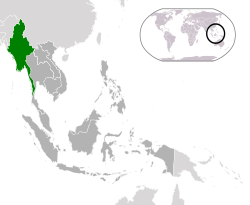Burmese Way to Socialism
| Union of Burma (1962–74) ပြည်ထောင်စု မြန်မာနိုင်ငံတော် Pyidaunzu Myăma Nainngandaw Socialist Republic of the Union of Burma (1974–88) |
||||||||||
|
ပြည်ထောင်စု ဆိုရှယ်လစ်သမ္မတ မြန်မာနိုင်ငံတော် Pyihtaunghcu Soshallaitsammat Myanmar Ninengantaw |
||||||||||
|
||||||||||
|
||||||||||
|
Anthem Kaba Ma Kyei Till the End of the World |
||||||||||
| Capital | Rangoon | |||||||||
| Languages | Burmese | |||||||||
| Religion | Buddhism | |||||||||
| Government | One-party socialist republic | |||||||||
| President | ||||||||||
| • | 1962–1981 (titled as Chairman of the Union Revolutionary Council until 1974) |
Ne Win | ||||||||
| • | 1981–1988 | San Yu | ||||||||
| • | 1988 | Sein Lwin | ||||||||
| • | 1988 | Aye Ko (acting) | ||||||||
| • | 1988 | Maung Maung | ||||||||
| Prime minister | ||||||||||
| • | 1962–1974 | Ne Win | ||||||||
| • | 1974–1977 | Sein Win | ||||||||
| • | 1977–1988 | Maung Maung Kha | ||||||||
| • | 1988 | Tun Tin | ||||||||
| Historical era | Cold War | |||||||||
| • | Coup d'etat | 2 March 1962 | ||||||||
| • | 8888 Uprising | 18 September 1988 | ||||||||
| Area | ||||||||||
| • | 1974 | 676,578 km² (261,228 sq mi) | ||||||||
| Currency | Kyat | |||||||||
|
||||||||||
| Today part of |
|
|||||||||
The Burmese Way to Socialism (Burmese: မြန်မာ့နည်းမြန်မာ့ဟန် ဆိုရှယ်လစ်စနစ်; also known as the Burmese Road to Socialism) refers to the ideology of the Socialist government in Burma, from 1962 to 1988, when the 1962 coup d'état was led by Ne Win and the military to remove U Nu from power. More specifically, the Burmese Way to Socialism is an economic treatise written in April 1962 by the Revolutionary Council, shortly after the coup, as a blueprint for economic development, reducing foreign influence in Burma, and increasing the role of the military.
The Burmese Way to Socialism has largely been described by scholars as being xenophobic, superstitious and an "abject failure," turning one of the most prosperous countries in Asia into one of the world's poorest. However, it may have served to increase domestic stability and keep Burma from being as entangled in the Cold War struggles that affected other Southeast Asian nations.
The Burmese Way to Socialism, by far, greatly increased poverty, isolation, and is described as "disastrous". Ne Win's later attempt to make the currency based in denominations divisible by 9, a number he considered auspicious, wiped out the savings of millions of Burmese. This resulted in the pro-democracy 8888 Uprising which was violently halted by the military, which established the State Law and Order Restoration Council in 1988.
The Socialist coup led by Ne Win and the Revolutionary Council (RC) in 1962 was done under the pretext of economic, religious and political crises in the country, particularly the issue of federalism and the right of Burmese states to secede from the Union.
Under U Nu and the AFPFL-led coalition government, Burma had implemented socialist economic and welfare policies, which yielded slow economic growth throughout the 1950s. On 28 October 1958, Ne Win had staged a coup, under the auspices of U Nu, who asked Ne Win to serve as interim prime minister, to restore order in the country, after the AFPFL split into two factions and U Nu barely survived a motion of no-confidence against his government in parliament. Ne Win restored order during the period known as the Ne Win caretaker government. Elections were held in February 1960 and Ne Win handed back power to the victorious U Nu on 4 April 1960.
...
Wikipedia



